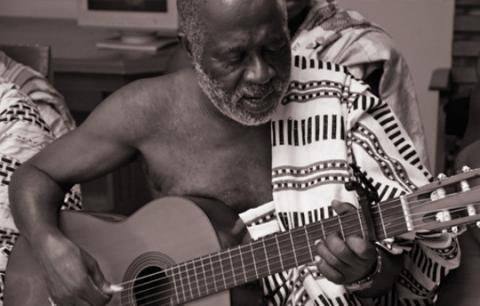posted by Swadhi Thanabal... on August 22, 2013 - 9:20am

As much as I love World Fusion (and, believe me, I do love fusional music), I have a thing for the uber-traditional stuff. I'm enchanted by the idea of history playing in my ears, hearing songs that moved people in ages long ago.
It seems the past has always had this allure. During the Italian Renaissance, for example, humanists looked to classical antiquity for inspiration. The Harlem Renaissance also saw artists retrospectively considering days and people past. This was the period in which Langston Hughes, peering back in time, wrote the famous poem "The Negro Speaks of Rivers," which connected the modern, hyphenated African-American with his most ancient ancestors:
"I bathed in the Euphrates when dawns were young.
I built my hut near the Congo and it lulled me to sleep.
I looked upon the Nile and raised the pyramids above it.
I heard the singing of the Mississippi when Abe Lincoln went down to New Orleans..."
And within the last half-century or so, all across the globe, the human fascination and compulsion to reconnect with the past has also come to play in music in a big way, with the whole roots revival movement.
In my own country of Sri Lanka, and in many other Asian and African countries, as I understand it, the impulse that grew into this trend was partly a response to decolonization: as the British empire receded in the early- to mid-1900s after decades of colonization, the need to establish and assert a national character led many countries to wipe the dust off their cultural heritage - songs and dances and thoughts and languages and ways of life which might have been lost, and which were important for these nations to remember, because it reminded them of who they were.
In these days of cultural fusion and globalization, maybe it's needlessly romantic to look to the traditions of the past for an idea of who we are at present. After all, through the internet, we all partake in a global culture to which all cultures are free to contribute, and this multicultural, interfused global culture is who we are. And certainly, as a music-lover, I can't deny that this global culture has produced some amazing music that works through barriers of race and place.
That said though, let's not forget that even cultural exchange takes place within inequal structures of power, and that global culture, despite the term "global," is desseminated through mass media which isn't equally dominated by all across the globe.
And not forgetting that, let's remember and continue to celebrate our roots even as our branches are so utterly and rather gloriously intertangled, our various folk songs, our diverse, unique traditions, as far back as we can; remember them because the fact remains that cultures may be eroded away by external pressure, and with them variety and depth in understanding and appreciating the world and ourselves.
(Image above from worldmusic.net)


